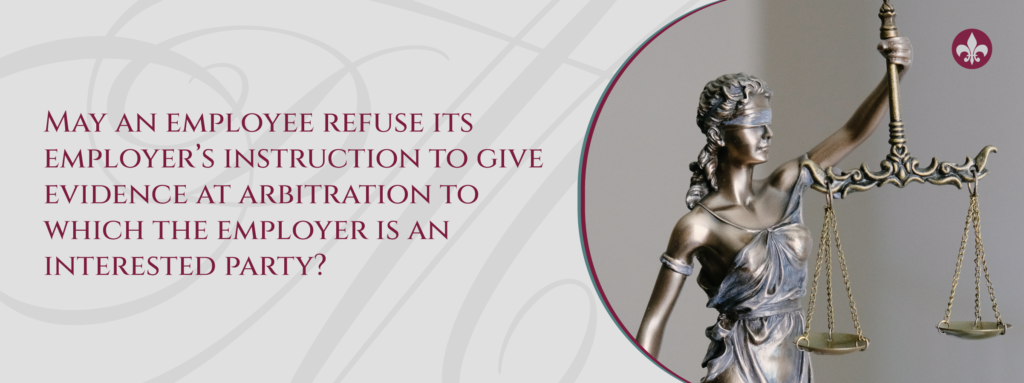
Kaefer Energy Projects (Pty) Ltd // CCMA & 2 Others [2021] (LAC)
Can an employer instruct an employee to give evidence at arbitration on its behalf? Is it misconduct if the employee refuses to do so? This topic was dealt with in the abovementioned case.
Background:
Ms. Lifa Sukazi was employed with Kaefer as an assistant administrator in 2012 and dismissed, two months into her new position, for misconduct on 18 July 2017 after a disciplinary hearing dealing with two allegations against her. The allegations of misconduct were (i) her refusal to testify against her co-employee on behalf of Kaefer at a misconduct arbitration brought by the co-employee and (ii) breaching her employment contract by her leaking confidential information. Ms. Sukazi referred an unfair dismissal dispute to the CCMA.
CCMA Arbitration:
In relation Ms. Sukazi refusing to testify on behalf of Kaefer, the Commissioner found (1) that there was no evidence led to show that she deliberately refused to testify in order to protect her now dismissed co-employee; (2) she had not committed misconduct and (3) if her testimony was so vitally important, Kaefer could have subpoenaed her to testify.
In relation to the second allegation, the Commissioner found that Ms. Sukazi was new in her position and had received no induction regarding the handling and disclosure of confidential information. Notwithstanding this, the Commissioner found she had misconducted herself and, due to her having a clean disciplinary record, a sanction of a final written warning (valid for 6 months) was appropriate. Kaefer challenged the award.
Labour Court:
Kaefer did not agree with the Commissioner’s finding that Ms. Sukazi had not committed misconduct by refusing the instruction to testify on Kaefer’s behalf at arbitration against the co-employee. Kaefer sought to set the award aside and have it substituted with an order that the dismissal was fair.
The LC arrived at the same conclusion as the Commissioner, but based on different reasons, namely;
Labour Appeal Court:
On appeal Kaefer contended that an employee owes a duty of good faith which stems from the contractual obligations towards an employer. This duty of good faith towards the employer was also premised on the case of NUMSA obo Ngazeni // Dunlop Mixing & Technical Services (2019)[CC], which dealt with the employee’s duty of good faith to report to the employer when other employees were responsible for acts of violence. To this end, Ms. Sukazi’s refusal to testify on Kaefer’s behalf amounts to insubordination. Kaefer went further, stating that all Ms. Sukazi was asked to do at arbitration was to recount what she saw. She was not asked or expected to purge herself.
Ms. Sukazi’s case was that she refused to be a witness as (1) she did not think her evidence was relevant and (2) did not want to “make a fool of herself” as she could not recall what was said between the two employees. She reiterated that her refusal was not deliberate and more importantly, she was not called to give evidence at the internal disciplinary hearing of the co-employee. Lastly she said that if it was so important that she testify, Kaefer should have subpoenaed her.
It is important to note that when the Commissioner had to determine if the employee was guilty of misconduct, he must consider –
– The misconduct that she was said to have committed, i.e. her refusal to carry out an instruction;
– Whether the instruction was lawful, reasonable or fair;
– Whether she was in a position to carry out the instruction; and
– Whether there was a lawful or reasonable excuse for her to refuse to carry out the instruction?
Evidence lead showed –
– Ms. Sukazi was, ahead of time, given the questions Kaefer’s attorneys would be asking her at the arbitration;
– She confirmed her memory recall and agreed to testify at the arbitration. However, over the weekend she changed her mind and informed Kaefer she would not testify as she could now not remember what had taken place; and
– Two things were certain at this time – (1) She remembered everything regarding the incident she had to testify to and (2) She was willing to testify before she changed her mind.
The LAC held that –
(i) the Commissioner construed what was required of him;
(ii) Ms. Sukazi was given clear instruction which was neither unreasonable nor unfair. She was instructed to testify but not told what to say. She had not been threatened nor was she fearful. Before she changed her mind, she had agreed to testify. Her excuses for not wanting to testify were not valid nor acceptable;
(iii) It is not for the employee to decide if her evidence was relevant;
(iv) While a subpoena is a tool litigants can use to compel an employee witness to testify does not mean that without it the employee can simply refuse the instruction;
(v) Essentially there was no reason for her to not testify and the Commissioner’s decision was not reasonable. She was guilty of the misconduct complained of by Kaefer; and
(vi) The Commissioner’ award was reviewed and set aside, the warning was set aside and it was held that the dismissal was fair.
In conclusion, where the instruction given by an employer, to an employee, satisfies the criteria which the Commissioner had to consider, the employee may be guilty of insubordination if he/she does not comply with the instruction.
Candace Bachmann – Associate Attorney
Justine Del Monte & Associates Incorporated

Kaefer Energy Projects (Pty) Ltd // CCMA & 2 Others [2021] (LAC)
Can an employer instruct an employee to give evidence at arbitration on its behalf? Is it misconduct if the employee refuses to do so? This topic was dealt with in the abovementioned case.
Background:
Ms. Lifa Sukazi was employed with Kaefer as an assistant administrator in 2012 and dismissed, two months into her new position, for misconduct on 18 July 2017 after a disciplinary hearing dealing with two allegations against her. The allegations of misconduct were (i) her refusal to testify against her co-employee on behalf of Kaefer at a misconduct arbitration brought by the co-employee and (ii) breaching her employment contract by her leaking confidential information. Ms. Sukazi referred an unfair dismissal dispute to the CCMA.
CCMA Arbitration:
In relation Ms. Sukazi refusing to testify on behalf of Kaefer, the Commissioner found (1) that there was no evidence led to show that she deliberately refused to testify in order to protect her now dismissed co-employee; (2) she had not committed misconduct and (3) if her testimony was so vitally important, Kaefer could have subpoenaed her to testify.
In relation to the second allegation, the Commissioner found that Ms. Sukazi was new in her position and had received no induction regarding the handling and disclosure of confidential information. Notwithstanding this, the Commissioner found she had misconducted herself and, due to her having a clean disciplinary record, a sanction of a final written warning (valid for 6 months) was appropriate. Kaefer challenged the award.
Labour Court:
Kaefer did not agree with the Commissioner’s finding that Ms. Sukazi had not committed misconduct by refusing the instruction to testify on Kaefer’s behalf at arbitration against the co-employee. Kaefer sought to set the award aside and have it substituted with an order that the dismissal was fair.
The LC arrived at the same conclusion as the Commissioner, but based on different reasons, namely;
Labour Appeal Court:
On appeal Kaefer contended that an employee owes a duty of good faith which stems from the contractual obligations towards an employer. This duty of good faith towards the employer was also premised on the case of NUMSA obo Ngazeni // Dunlop Mixing & Technical Services (2019)[CC], which dealt with the employee’s duty of good faith to report to the employer when other employees were responsible for acts of violence. To this end, Ms. Sukazi’s refusal to testify on Kaefer’s behalf amounts to insubordination. Kaefer went further, stating that all Ms. Sukazi was asked to do at arbitration was to recount what she saw. She was not asked or expected to purge herself.
Ms. Sukazi’s case was that she refused to be a witness as (1) she did not think her evidence was relevant and (2) did not want to “make a fool of herself” as she could not recall what was said between the two employees. She reiterated that her refusal was not deliberate and more importantly, she was not called to give evidence at the internal disciplinary hearing of the co-employee. Lastly she said that if it was so important that she testify, Kaefer should have subpoenaed her.
It is important to note that when the Commissioner had to determine if the employee was guilty of misconduct, he must consider –
– The misconduct that she was said to have committed, i.e. her refusal to carry out an instruction;
– Whether the instruction was lawful, reasonable or fair;
– Whether she was in a position to carry out the instruction; and
– Whether there was a lawful or reasonable excuse for her to refuse to carry out the instruction?
Evidence lead showed –
– Ms. Sukazi was, ahead of time, given the questions Kaefer’s attorneys would be asking her at the arbitration;
– She confirmed her memory recall and agreed to testify at the arbitration. However, over the weekend she changed her mind and informed Kaefer she would not testify as she could now not remember what had taken place; and
– Two things were certain at this time – (1) She remembered everything regarding the incident she had to testify to and (2) She was willing to testify before she changed her mind.
The LAC held that –
(i) the Commissioner construed what was required of him;
(ii) Ms. Sukazi was given clear instruction which was neither unreasonable nor unfair. She was instructed to testify but not told what to say. She had not been threatened nor was she fearful. Before she changed her mind, she had agreed to testify. Her excuses for not wanting to testify were not valid nor acceptable;
(iii) It is not for the employee to decide if her evidence was relevant;
(iv) While a subpoena is a tool litigants can use to compel an employee witness to testify does not mean that without it the employee can simply refuse the instruction;
(v) Essentially there was no reason for her to not testify and the Commissioner’s decision was not reasonable. She was guilty of the misconduct complained of by Kaefer; and
(vi) The Commissioner’ award was reviewed and set aside, the warning was set aside and it was held that the dismissal was fair.
In conclusion, where the instruction given by an employer, to an employee, satisfies the criteria which the Commissioner had to consider, the employee may be guilty of insubordination if he/she does not comply with the instruction.
Candace Bachmann – Associate Attorney
Justine Del Monte & Associates Incorporated



